1-20一般疑问句总结
初中英语知识点归纳一般疑问句的变化与回答

初中英语知识点归纳一般疑问句的变化与回答一、一般疑问句的基本结构及变化规则在初中英语学习中,我们经常会遇到一般疑问句。
一般疑问句是用于询问某个陈述句的真实性或确认某个说法的问句形式。
下面我们来归纳一下一般疑问句的基本结构及变化规则。
1. 陈述句结构:主语 + 动词 + 其他成分例如:You like football.中文意思:你喜欢足球。
2. 一般疑问句结构:助动词 + 主语 + 动词 + 其他成分?例如:Do you like football?中文意思:你喜欢足球吗?3. 助动词的变化规则:a. 变为否定疑问句时,助动词用do/does/did,主语要用否定形式。
例如:Don't you like football?中文意思:你不喜欢足球吗?b. 主语为第三人称单数时,助动词用does,其他形式不变。
例如:Does he like football?中文意思:他喜欢足球吗?4. 回答一般疑问句时的基本方式:a. Yes回答:表示肯定回答。
例如:Do you like football? Yes, I do.中文意思:你喜欢足球吗?是的,我喜欢。
b. No回答:表示否定回答。
例如:Do you like football? No, I don't.中文意思:你喜欢足球吗?不,我不喜欢。
二、一般疑问句的特殊情况及回答方式除了基本的一般疑问句结构和变化规则外,还存在一些特殊情况。
下面我们来看一下这些特殊情况及相应的回答方式。
1. 一般疑问句中的特殊疑问词:a. 特殊疑问词一般用来询问某个具体信息,如地点、时间、原因等。
例如:Where does he live?中文意思:他住在哪里?b. 特殊疑问词在一般疑问句中通常出现在句首,然后按照一般疑问句的结构进行变化。
例如:What do you want to eat?中文意思:你想吃什么?2. 含有情态动词的一般疑问句:a. 当一般疑问句中含有情态动词时,将情态动词放在句首,然后按照一般疑问句的结构进行变化。
一般疑问句口诀
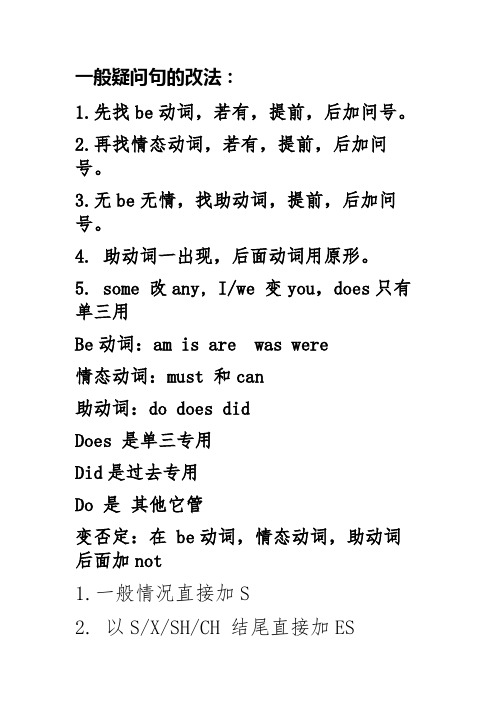
一般疑问句的改法:
1.先找be动词,若有,提前,后加问号。
2.再找情态动词,若有,提前,后加问号。
3.无be无情,找助动词,提前,后加问号。
4. 助动词一出现,后面动词用原形。
5. some 改any, I/we 变you,does只有单三用
Be动词:am is are was were
情态动词:must 和can
助动词:do does did
Does 是单三专用
Did是过去专用
Do 是其他它管
变否定:在 be动词,情态动词,助动词后面加not
1.一般情况直接加S
2. 以S/X/SH/CH 结尾直接加ES
3. O 结尾有生命加es 无生命加s
4. 以f 或是 fe 结尾去f加ves.
5. 以y 结尾。
Y前面是好人直接加s。
前面是坏人去y加ies.
6. 不规则。
a 变e
(素材和资料部分来自网络,供参考。
可复制、编制,期待您的好评与关注)。
小学英语疑问句
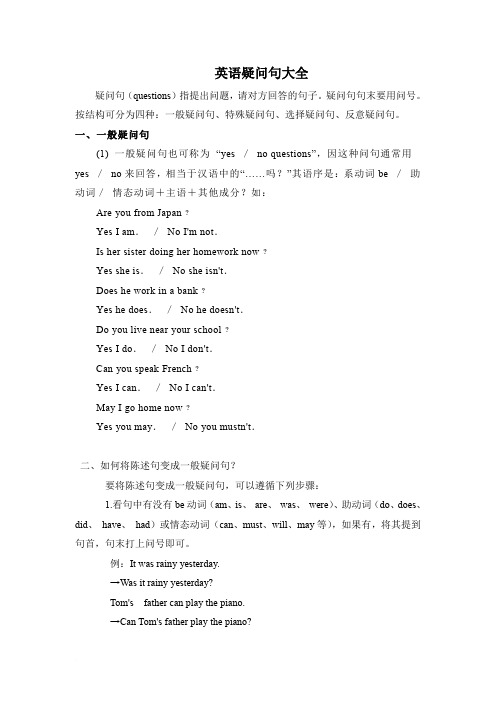
英语疑问句大全疑问句(questions)指提出问题,请对方回答的句子。
疑问句句末要用问号。
按结构可分为四种:一般疑问句、特殊疑问句、选择疑问句、反意疑问句。
一、一般疑问句(1) 一般疑问句也可称为“yes /no questions”,因这种问句通常用yes /no来回答,相当于汉语中的“……吗?”其语序是:系动词be /助动词/情态动词+主语+其他成分?如:Are you from Japan﹖Yes I am./No I'm not.Is her sister doing her homework now﹖Yes she is./No she isn't.Does he work in a bank﹖Yes he does./No he doesn't.Do you live near your school﹖Yes I do./No I don't.Can you speak French﹖Yes I can./No I can't.May I go home now﹖Yes you may./No you mustn't.二、如何将陈述句变成一般疑问句?要将陈述句变成一般疑问句,可以遵循下列步骤:1.看句中有没有be动词(am、is、are、was、were)、助动词(do、does、did、have、had)或情态动词(can、must、will、may等),如果有,将其提到句首,句末打上问号即可。
例:It was rainy yesterday.→Was it rainy yesterday?Tom's father can play the piano.→Can Tom's father play the piano?I have finished my homework.→Have you finished your homework?2.如果句中没有be动词、助动词或情态动词,则根据谓语动词的形式借助do的相应形式放在句首。
一般疑问句和特殊疑问句知识点总结

一般疑问句和特殊疑问句知识点总结疑问句最常见的疑问句有两类:1.一般疑问句:可以用Yes和No回答的问句2.特殊疑问句:以特殊疑问词7w1h(比如what/how等等)开头的疑问句一般疑问句(句型结构会根据时态发生相应的细微变化,但总体框架不变)①be动词+主语+其他?(注意be动词和主语的匹配)例句:Areyoua policeman?你是个警察吗?-Yes, I am.是的,我是。
-No, I am not.不,我不是。
②情态动词+主语+动词原形+其他?(注意情态动词后面跟动词原形)例句:Canyouswim?你会游泳吗?-Yes, I can.是的,我会。
-No, I can’t.不,我不会。
③助动词+主语+动词原形+其他?(注意助动词和主语的匹配)例句:Doyoulikedancing?你喜欢跳舞吗?-Yes, I do.是的,我喜爱。
-No, I don’t.不,我不喜欢。
Doyougoto school every day?你每天去学校吗?做句型转换的方法(如何将陈述句变成一般疑问句):先看句子中是否有be动词或者情态动词A.如果有be动词或者情态动词,对照一般疑问句句型①/②将be动词或者情态动词提到句首,其他局部依次照抄B.如果没有be动词或者情态动词,对照一般疑问句句型③句首+助动词(注意是不是要和主语婚配变化),其他局部依次照抄,注意原来的动词要变为真相#无论是哪种情况,都要注意第一人称要酿成第二人称,第二人称要酿成第一人称(you和I的切换)非凡疑问句(句型结构会根据时态发生相应的细微变化,但总体框架不变)①特殊疑问词(作主语)+谓语+其他?(陈述句语序)例句:Whois reading a book?谁正在读书?Whichis the biggest?哪个是最大的?Wholikes dancing?谁喜爱跳舞?②非凡疑问词(作主语修饰语)+主语+谓语+其他?(陈说句语序)例句:Whosebagis red?谁的包是红色的?How manypeoplework in the school?有多少人在学校工作?③特殊疑问词+一般疑问句(详见上面的一般疑问句结构)?(此情况为当特殊疑问词代替的部分不是主语或者主语修饰语时)例句:What areyoudoing?你在做什么?What colour doyoulike?你喜欢什么颜色?做句型转换的方法(如何将句子转变成特殊疑问句):先看划线局部是不是为句子中的主语或者主语修饰语A.如果是主语,对照非凡疑问句句型①划线部分用特殊疑问词代替,其他部分照抄(该疑问句为陈述句语序)B.如果是主语修饰语,对照特殊疑问句句型②划线部分用特殊疑问词代替,其他部分照抄(该疑问句为陈述句语序)C.如果不是主语或者主语修饰语,对照特殊疑问句句型③先将原来的陈述句变成一般疑问句(如果本来就是一般疑问句就不需要再做修改)划线局部用非凡疑问词替代再将特殊疑问词提前到句首#如果划线局部是动词或者动词短语,表示做什么事,那变为非凡疑问词的时候要用do what替代非凡疑问词主要分为两类:wh-(wh开头的疑问词)和how - (how开头的疑问词)疑问词whatwhowhosewhichwherewhenwhywhat for what colour what day what date what time 含义什么谁谁的哪一个在哪里什么时候为什么为什么什么颜色星期几什么日期几点钟用法问东西问人问归属问挑选问地址问时间问原因。
一般疑问句知识点
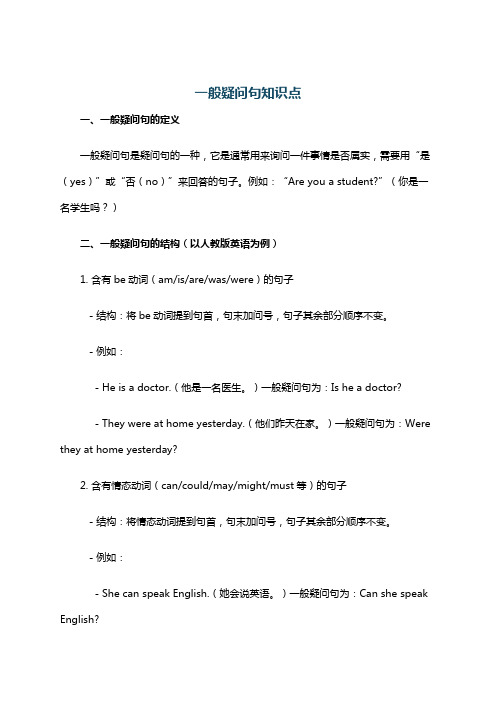
一般疑问句知识点一、一般疑问句的定义一般疑问句是疑问句的一种,它是通常用来询问一件事情是否属实,需要用“是(yes)”或“否(no)”来回答的句子。
例如:“Are you a student?”(你是一名学生吗?)二、一般疑问句的结构(以人教版英语为例)1. 含有be动词(am/is/are/was/were)的句子- 结构:将be动词提到句首,句末加问号,句子其余部分顺序不变。
- 例如:- He is a doctor.(他是一名医生。
)一般疑问句为:Is he a doctor?- They were at home yesterday.(他们昨天在家。
)一般疑问句为:Were they at home yesterday?2. 含有情态动词(can/could/may/might/must等)的句子- 结构:将情态动词提到句首,句末加问号,句子其余部分顺序不变。
- 例如:- She can speak English.(她会说英语。
)一般疑问句为:Can she speak English?- You must go to school on time.(你必须按时上学。
)一般疑问句为:Must you go to school on time?3. 含有实义动词(行为动词)的句子(一般现在时和一般过去时)- 一般现在时- 当主语为非第三人称单数(I/you/we/they等)时,结构为:Do+主语+动词原形+其他?- 例如:I like apples.(我喜欢苹果。
)一般疑问句为:Do you like apples?- 当主语为第三人称单数(he/she/it等)时,结构为:Does+主语+动词原形+其他?- 例如:He likes reading.(他喜欢阅读。
)一般疑问句为:Does he like reading?- 一般过去时- 结构为:Did+主语+动词原形+其他?- 例如:They played football yesterday.(他们昨天踢足球了。
小学英语特殊疑问句和一般疑问句的归纳

特殊疑问句和一般疑问句的答法一般疑问句通常都是1..以be (am,is,are,)开头2.以Do,Does,Did 开头或以Can开头回答方法:前面用什么提问的就用什么答。
只有两种回答方式:1)肯定的,Yes,主语+ 提问词.2)否定的No,主语+提问词+not.【注意:问句与答句的第一二人称要互换】如:④主语是名字时的答语:看性别,男的用he ,女的用she ,其他的用it 复数就用they。
如:①Is she……? Is he………? Is it……..?Yes, she is.Yes, he is. Yes, it is.No, she isn,t. No, he isn,t. No, it isn,t.②Are they………? Are the monkeys …….?Yes, they are.Yes, they are.No,they aren’t No,they aren’t③Do they………?Does he……..? Did she…….?Yes,they do. Yes,he does. Yes, she did.No,they don’t. No,he doesn’t. No,she didn’t.④Are you……..?Are you……..? Do you…….?Yes, I am.Yes, we are. Yes ,I do. 或Yes,No, I am not. No, we aren’t. No,I don’t. 或No,⑤Does Mike…….? Is ChenJi…..? Do your parents…?Yes ,he does.Yes , she is. Yes, they do.No,he doesn’t. No, she isn’t. No,they don’t.一、专项练习。
1. Did ChenJie read books yesterday?2. Can the girl cook the meals ?—————————————————————————————3.Is he going to swim this afternoon?4. Are they going to take a trip next weend? ————————————————————————————————5.Does he often go to school by bike ? 6. Do you play basketball every weekend? ———————————————————————————————————7. Did Mike do his homework yesterday? 8. Are they playing basketball now?————————————————————————————————一般疑问句及特殊疑问句的总结一般疑问句的定义:用yes或no来回答的疑问句叫一般疑问句。
一般疑问句笔记
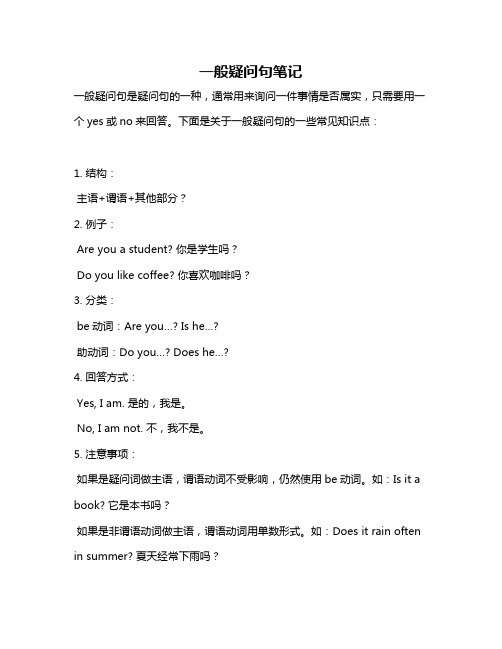
一般疑问句笔记一般疑问句是疑问句的一种,通常用来询问一件事情是否属实,只需要用一个yes或no来回答。
下面是关于一般疑问句的一些常见知识点:1. 结构:主语+谓语+其他部分?2. 例子:Are you a student? 你是学生吗?Do you like coffee? 你喜欢咖啡吗?3. 分类:be动词:Are you…? Is he…?助动词:Do you…? Does he…?4. 回答方式:Yes, I am. 是的,我是。
No, I am not. 不,我不是。
5. 注意事项:如果是疑问词做主语,谓语动词不受影响,仍然使用be动词。
如:Is it a book? 它是本书吗?如果是非谓语动词做主语,谓语动词用单数形式。
如:Does it rain often in summer? 夏天经常下雨吗?6. 与特殊疑问句的区别:一般疑问句通常以be动词、助动词或情态动词开头,询问事实或观点。
特殊疑问句通常以疑问词开头,询问具体信息或细节。
7. 变否定句的方法:在谓语前加助动词的否定形式。
如:Do not (Don’t) you like coffee? 你不喜欢咖啡吗?8. 常见的疑问词:What 什么Who 谁When 什么时候Where 哪里Why 为什么How 怎么样9. 缩写形式:Amn→Are youIst→Is thatIst→Is he10. 其他常见用法:在回答一般疑问句时,通常使用简短的肯定或否定回答,而不是完整的句子。
如:Yes/No, I do/don’t.在某些语境下,也可以用缩写形式进行回答。
如:yep/nope(Yes/No)。
小学英语语法一般疑问句
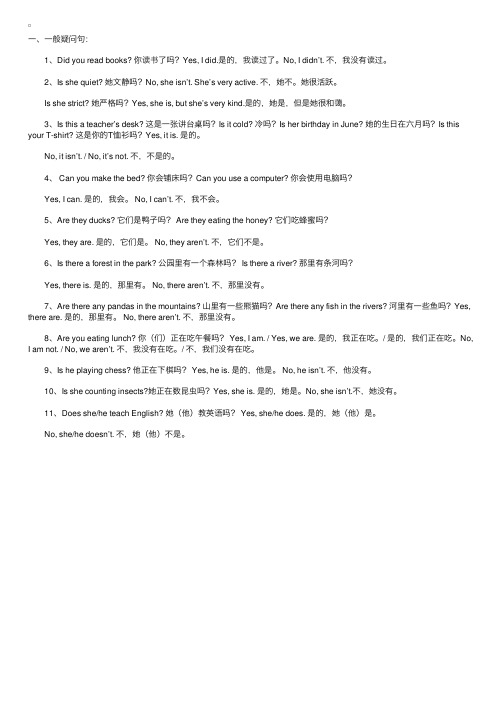
⼀、⼀般疑问句: 1、Did you read books? 你读书了吗?Yes, I did.是的,我读过了。
No, I didn’t. 不,我没有读过。
2、Is she quiet? 她⽂静吗?No, she isn’t. She’s very active. 不,她不。
她很活跃。
Is she strict? 她严格吗?Yes, she is, but she’s very kind.是的,她是,但是她很和蔼。
3、Is this a teacher’s desk? 这是⼀张讲台桌吗?Is it cold? 冷吗?Is her birthday in June? 她的⽣⽇在六⽉吗?Is this your T-shirt? 这是你的T恤衫吗?Yes, it is. 是的。
No, it isn’t. / No, it’s not. 不,不是的。
4、 Can you make the bed? 你会铺床吗?Can you use a computer? 你会使⽤电脑吗? Yes, I can. 是的,我会。
No, I can’t. 不,我不会。
5、Are they ducks? 它们是鸭⼦吗? Are they eating the honey? 它们吃蜂蜜吗? Yes, they are. 是的,它们是。
No, they aren’t. 不,它们不是。
6、Is there a forest in the park? 公园⾥有⼀个森林吗? Is there a river? 那⾥有条河吗? Yes, there is. 是的,那⾥有。
No, there aren’t. 不,那⾥没有。
7、Are there any pandas in the mountains? ⼭⾥有⼀些熊猫吗?Are there any fish in the rivers? 河⾥有⼀些鱼吗?Yes, there are. 是的,那⾥有。
一般疑问句和特殊疑问句知识点总结

一般疑问句和特殊疑问句知识点总结一、一般疑问句。
1. 定义。
- 一般疑问句是用来询问某事是否属实,需要用“是(yes)”或“否(no)”来回答的疑问句。
例如:“Are you a student?”(你是一名学生吗?)2. 结构。
- be动词(am/is/are/was/were)开头的一般疑问句。
- 当句子中有be动词时,将be动词提到句首,句末加问号,句子中的主语如果是第一人称要变为第二人称。
- 肯定句:I am a teacher.(我是一名教师。
)- 一般疑问句:Are you a teacher?(你是一名教师吗?)- 其回答形式为:Yes, 主语+be动词. / No, 主语+be动词+not.- 例如:Are you from China? Yes, I am. / No, I'm not.- 助动词(do/does/did)开头的一般疑问句。
- 当句子中的谓语动词是实义动词,且句子时态为一般现在时(主语不是第三人称单数用do,主语是第三人称单数用does)或一般过去时(用did)时,将助动词提到句首,动词恢复原形,句末加问号。
- 肯定句:He likes apples.(他喜欢苹果。
)- 一般疑问句:Does he like apples?(他喜欢苹果吗?)- 肯定句:I played football yesterday.(我昨天踢足球了。
)- 一般疑问句:Did you play football yesterday?(你昨天踢足球了吗?)- 回答形式为:Yes, 主语+do/does/did. / No, 主语+don't/doesn't/didn't.- 例如:Do they go to school by bike? Yes, they do. / No, they don't.- 情态动词(can/could/may/must等)开头的一般疑问句。
3L英语知识点(1~20)
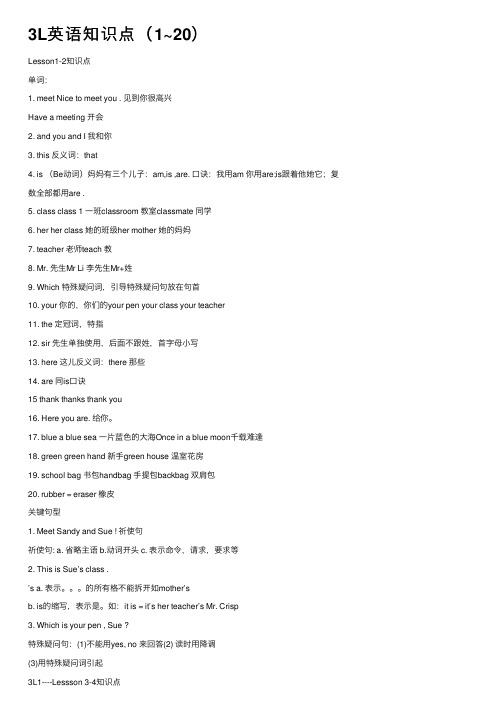
3L英语知识点(1~20)Lesson1-2知识点单词:1. meet Nice to meet you . 见到你很⾼兴Have a meeting 开会2. and you and I 我和你3. this 反义词:that4. is (Be动词)妈妈有三个⼉⼦:am,is ,are. ⼝诀:我⽤am 你⽤are;is跟着他她它;复数全部都⽤are .5. class class 1 ⼀班classroom 教室classmate 同学6. her her class 她的班级her mother 她的妈妈7. teacher ⽼师teach 教8. Mr. 先⽣Mr Li 李先⽣Mr+姓9. Which 特殊疑问词,引导特殊疑问句放在句⾸10. your 你的,你们的your pen your class your teacher11. the 定冠词,特指12. sir 先⽣单独使⽤,后⾯不跟姓,⾸字母⼩写13. here 这⼉反义词:there 那些14. are 同is⼝诀15 thank thanks thank you16. Here you are. 给你。
17. blue a blue sea ⼀⽚蓝⾊的⼤海Once in a blue moon千载难逢18. green green hand 新⼿green house 温室花房19. school bag 书包handbag ⼿提包backbag 双肩包20. rubber = eraser 橡⽪关键句型1. Meet Sandy and Sue ! 祈使句祈使句: a. 省略主语 b.动词开头 c. 表⽰命令,请求,要求等2. This is Sue’s class .’s a. 表⽰。
的所有格不能拆开如mother’sb. is的缩写,表⽰是。
如:it is = it’s her teacher’s Mr. Crisp3. Which is your pen , Sue ?特殊疑问句:(1)不能⽤yes, no 来回答(2) 读时⽤降调(3)⽤特殊疑问词引起3L1----Lessson 3-4知识点单词:1. his 他的(所有格)主格I you she he it they we所有格my your her his its their our2. Miss 对应词Mr3. Williams 姓4. whose 谁的who 谁5. cap 帽⼦(前沿帽)hat 帽⼦(全沿帽)6. it 代词7.yes 升调(什么事)降调(是的)反义词:no8. come 反go sit 反stand up 反downstand up 反sit down9. please 放在句⾸句尾都可以短语Sandy’s class his teacher this cap come hereyour cap sit down句型1. This is Sandy’s class. 所有格…的2. His teacher’s Miss Williams. 缩写…是3. Whose is this cap? = Whose cap is this ?4. It’s Sandy’s .(省略句) It’s Sandy’s (cap)5. Is this your cap ?(⼀般疑问句)Yes, it is \No, it isn’t6. Which book is Sandy’s ? ----The green book .语法:( 1 )whose 引导的特殊疑问句(2)Is this your cap?等⼀般疑问句(3)形容词性物主代词(所有格):his, her, my, your, its,our, their主格he, she, I, you, it, we, theyLesson5-6知识点Lesson5单词1. kick 踢2. ball football, volleyball ,basketball ,balloon , ballpen3. all We are all here. 我们全都在这⼉。
小学英语疑问句

小学英语疑问句英语疑问句大全疑问句(questions)指提出问题,请对方回答的句子。
疑问句句末要用问号。
按结构可分为四种:一般疑问句、特殊疑问句、选择疑问句、反意疑问句。
一、一般疑问句(1) 一般疑问句也可称为“yes /no questions”,因这种问句通常用yes /no来回答,相当于汉语中的“……吗?”其语序是:系动词be /助动词/情态动词+主语+其他成分?如:Are you from Japan﹖Yes I am./No I'm not.Is her sister doing her homework now﹖Yes she is./No she isn't.Does he work in a bank﹖Yes he does./No he doesn't.Do you live near your school﹖Yes I do./No I don't.Can you speak French﹖Yes I can./No I can't.May I go home now﹖Yes you may./No you mustn't.1.将陈述句变为一般疑问句时,如句中有be 动词(am is are …)时,可直接将它们提至主语前。
如主语为第一人称,应将其改为第二人称。
如:I'm in Class 2 Grade 1.→Are you in Class 2 Grade 1?We're watching TV.→Are you watching TV﹖2.陈述句中有情态动词(can may must …)时,也可直接将它们提至主语前,即可成为一般疑问句。
如:He can swim now.→Can he swim now﹖The children may come with us.→ May the children come with us﹖3. 陈述句中只有一个实义动词作谓语且其时态为一般现在时,变为一般疑问句时要在句首加do或does 主语后的实义动词用原形。
英语中的一般疑问句
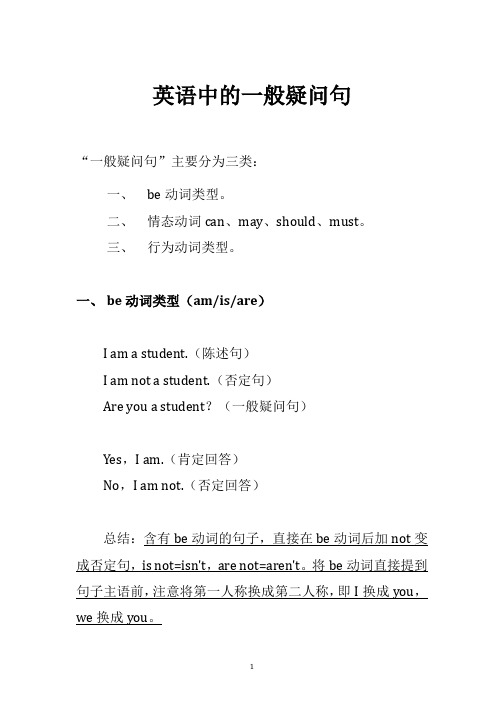
英语中的一般疑问句“一般疑问句”主要分为三类:一、be动词类型。
二、情态动词can、may、should、must。
三、行为动词类型。
一、be动词类型(am/is/are)I am a student.(陈述句)I am not a student.(否定句)Are you a student?(一般疑问句)Yes,I am.(肯定回答)No,I am not.(否定回答)总结:含有be动词的句子,直接在be动词后加not变成否定句,is not=isn't,are not=aren't。
将be动词直接提到句子主语前,注意将第一人称换成第二人称,即I换成you,we换成you。
二、情态动词类型(can/may/should/must)He can play basketball.(陈述句)He can not play basketball.(否定句)Can he play basketball?(一般疑问句)Yes,he can.(肯定回答)No,he can not.(否定回答)总结:含有情态动词的句子,变否定直接在情态动词后加not,变一般疑问句直接将情态动词提前。
三、行为动词类型I go to school by bike.(陈述句)I do not go to school by bike.(否定句)Do you go to school by bike?(一般疑问句)Yes,I do.(肯定回答)No,I do not.(否定回答)She goes to school by bike.(陈述句)She does not go to school by bike.(否定句)Does she go to school by bike?(一般疑问句)Yes,she does.(肯定回答)No,she does not.(否定回答)总结:行为动词变否定和一般疑问需要借助助动词do 或者does,当主语是第三人称单数时,助动词用does。
一般疑问句
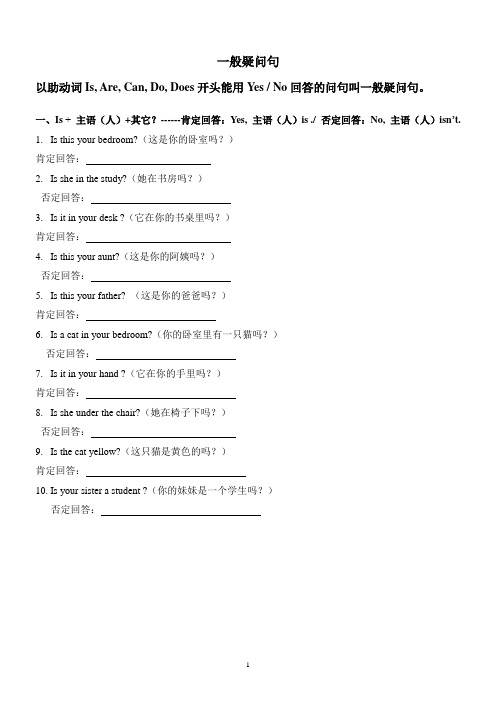
一般疑问句以助动词Is, Are, Can, Do, Does开头能用Yes / No回答的问句叫一般疑问句。
一、Is +主语(人)+其它?------肯定回答:Yes, 主语(人)is ./ 否定回答:No, 主语(人)isn’t.1.Is this your bedroom?(这是你的卧室吗?)肯定回答:2.Is she in the study?(她在书房吗?)否定回答:3.Is it in your desk ?(它在你的书桌里吗?)肯定回答:4.Is this your aunt?(这是你的阿姨吗?)否定回答:5.Is this your father? (这是你的爸爸吗?)肯定回答:6.Is a cat in your bedroom?(你的卧室里有一只猫吗?)否定回答:7.Is it in your hand ?(它在你的手里吗?)肯定回答:8.Is she under the chair?(她在椅子下吗?)否定回答:9.Is the cat yellow?(这只猫是黄色的吗?)肯定回答:10.Is your sister a student ?(你的妹妹是一个学生吗?)否定回答:二、Are + 主语(人)+其它?------肯定回答:Yes, 主语(人)are ./ 否定回答:No, 主语(人)aren’t.1.Are they on the table? (它们在桌子上吗?)肯定回答:2.Are they near the phone?(它个在电话上吗?)否定回答:3.Are they farmers?(他们是农民吗?)肯定回答:4.Are the pencils on the desk?(铅笔在书桌上吗?)否定回答:5.Are you a student?(你是一个学生吗?肯定回答:三、Can+ 主语(人)+其它?------肯定回答:Yes, 主语(人)can. /否定回答:No, 主语(人)can’t.1.Can you spell this words? (你会拼这些单词吗?)肯定回答否定回答:2.Can I have some noodles, please? (请问我能吃一些面条吗?)肯定回答:3.Mom, can I help?(妈妈,我能帮助你吗?)肯定回答:. 否定回答:四、Do + 主语(人)+其它?------肯定回答:Yes, 主语(人)do . /否定回答:No, 主语(人)don’t.1.Do you know?(你认识吗?)肯定:否定2.Do you like them? (你喜欢它们吗?)肯定回答:3.Do you have a computer in it? (你有一台电脑吗?)否定回答:4.Do you like your classroom?(你喜欢你的教室吗?)肯定回答:。
一般疑问句_特殊疑问句
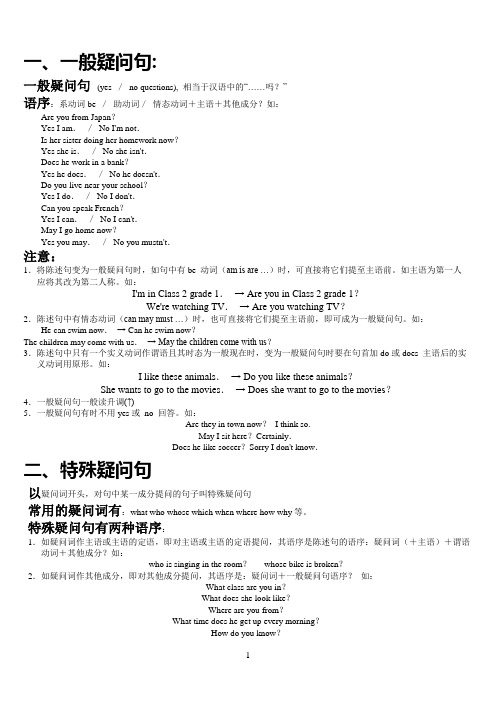
一、一般疑问句:一般疑问句(yes /no questions), 相当于汉语中的“……吗?”语序:系动词be /助动词/情态动词+主语+其他成分?如:Are you from Japan?Yes I am./No I'm not.Is her sister doing her homework now?Yes she is./No she isn't.Does he work in a bank?Yes he does./No he doesn't.Do you live near your school?Yes I do./No I don't.Can you speak French?Yes I can./No I can't.May I go home now?Yes you may./No you mustn't.注意:1.将陈述句变为一般疑问句时,如句中有be 动词(am is are …)时,可直接将它们提至主语前。
如主语为第一人应将其改为第二人称。
如:I'm in Class 2 grade 1.→ Are you in Class 2 grade 1?We're watching TV.→ Are you watching TV?2.陈述句中有情态动词(can may must …)时,也可直接将它们提至主语前,即可成为一般疑问句。
如:He can swim now.→ Can he swim now?The children may come with us.→ May the children come with us?3.陈述句中只有一个实义动词作谓语且其时态为一般现在时,变为一般疑问句时要在句首加do或does 主语后的实义动词用原形。
如:I like these animals.→ Do you like these animals?She wants to go to the movies.→ Does she want to go to the movies?4.一般疑问句一般读升调(↑)5.一般疑问句有时不用yes或no 回答。
一般疑问句知识点总结归纳
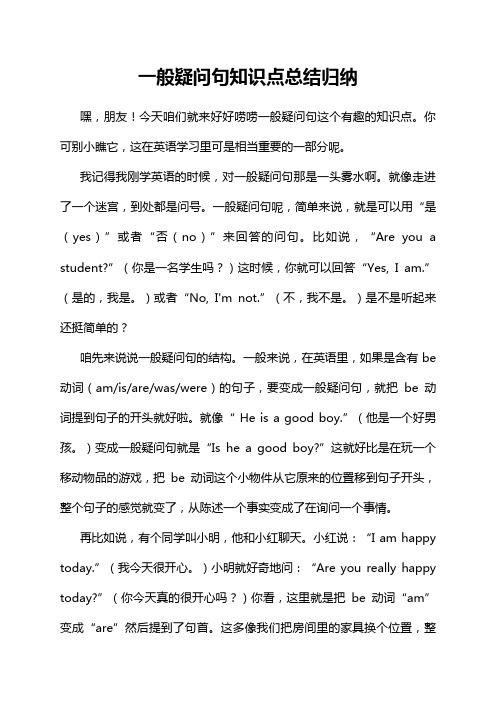
一般疑问句知识点总结归纳嘿,朋友!今天咱们就来好好唠唠一般疑问句这个有趣的知识点。
你可别小瞧它,这在英语学习里可是相当重要的一部分呢。
我记得我刚学英语的时候,对一般疑问句那是一头雾水啊。
就像走进了一个迷宫,到处都是问号。
一般疑问句呢,简单来说,就是可以用“是(yes)”或者“否(no)”来回答的问句。
比如说,“Are you a student?”(你是一名学生吗?)这时候,你就可以回答“Yes, I am.”(是的,我是。
)或者“No, I'm not.”(不,我不是。
)是不是听起来还挺简单的?咱先来说说一般疑问句的结构。
一般来说,在英语里,如果是含有be 动词(am/is/are/was/were)的句子,要变成一般疑问句,就把be动词提到句子的开头就好啦。
就像“ He is a good boy.”(他是一个好男孩。
)变成一般疑问句就是“Is he a good boy?”这就好比是在玩一个移动物品的游戏,把be动词这个小物件从它原来的位置移到句子开头,整个句子的感觉就变了,从陈述一个事实变成了在询问一个事情。
再比如说,有个同学叫小明,他和小红聊天。
小红说:“I am happy today.”(我今天很开心。
)小明就好奇地问:“Are you really happy today?”(你今天真的很开心吗?)你看,这里就是把be动词“am”变成“are”然后提到了句首。
这多像我们把房间里的家具换个位置,整个房间的布局就不一样了呢。
还有含有实义动词的句子。
如果句子是一般现在时,而且主语是第三人称单数(he/she/it等),那在变成一般疑问句的时候,就得借助助动词“does”,而且原来的动词要变回原形。
就像“He likes apples.”(他喜欢苹果。
)变成一般疑问句就是“Does he like apples?”这感觉就像是给句子来了个小魔法,加了个特殊的魔法元素“does”,让它从陈述变成了询问。
疑问句总结
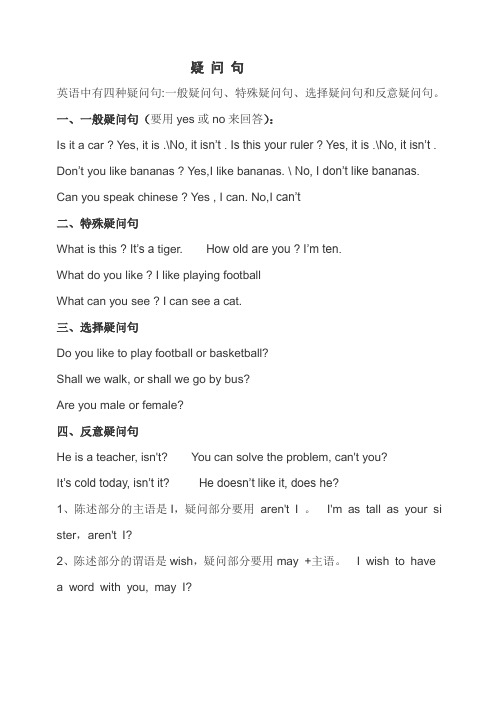
疑问句英语中有四种疑问句:一般疑问句、特殊疑问句、选择疑问句和反意疑问句。
一、一般疑问句(要用yes或no来回答):Is it a car ? Yes, it is .\No, it isn’t . Is this your ruler ? Yes, it is .\No, it isn’t . Don’t you like bananas ? Yes,I like bananas. \ No, I don’t like bananas. Can you speak chinese ? Yes , I can. No,I can’t二、特殊疑问句What is this ? It’s a tiger. How old are you ? I’m ten.What do you like ? I like playing footballWhat can you see ? I can see a cat.三、选择疑问句Do you like to play football or basketball?Shall we walk, or shall we go by bus?Are you male or female?四、反意疑问句He is a teacher, isn't? You can solve the problem, can't you?It’s cold today, isn’t it? He doesn’t like it, does he?1、陈述部分的主语是I,疑问部分要用aren't I 。
I'm as tall as your si ster,aren't I?2、陈述部分的谓语是wish,疑问部分要用may +主语。
I wish to havea word with you, may I?3、陈述部分用no, nothing, nobody, never, few, seldom, hardly, rarely, little等否定含义的词时,疑问部分用肯定含义。
一般疑问句及特殊疑问句总结(针对小学阶段学生)
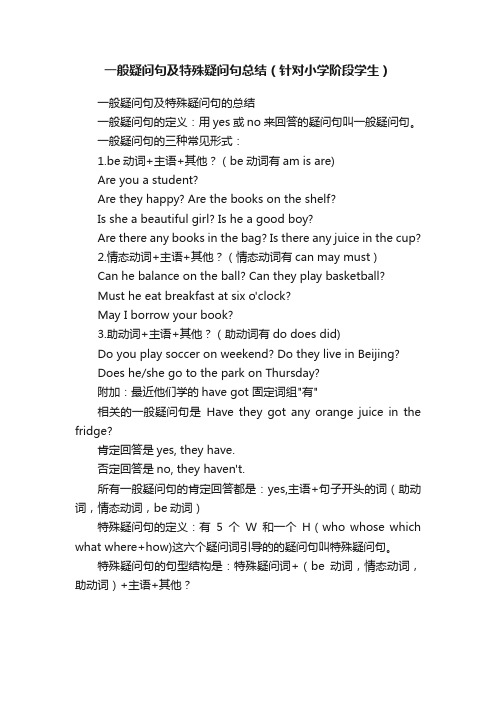
一般疑问句及特殊疑问句总结(针对小学阶段学生)一般疑问句及特殊疑问句的总结一般疑问句的定义:用yes或no来回答的疑问句叫一般疑问句。
一般疑问句的三种常见形式:1.be动词+主语+其他?(be动词有am is are)Are you a student?Are they happy? Are the books on the shelf?Is she a beautiful girl? Is he a good boy?Are there any books in the bag? Is there any juice in the cup?2.情态动词+主语+其他?(情态动词有can may must )Can he balance on the ball? Can they play basketball?Must he eat breakfast at six o'clock?May I borrow your book?3.助动词+主语+其他?(助动词有do does did)Do you play soccer on weekend? Do they live in Beijing?Does he/she go to the park on Thursday?附加:最近他们学的have got 固定词组"有"相关的一般疑问句是Have they got any orange juice in the fridge?肯定回答是yes, they have.否定回答是no, they haven't.所有一般疑问句的肯定回答都是:yes,主语+句子开头的词(助动词,情态动词,be动词)特殊疑问句的定义:有5个W和一个H(who whose which what where+how)这六个疑问词引导的的疑问句叫特殊疑问句。
特殊疑问句的句型结构是:特殊疑问词+(be动词,情态动词,助动词)+主语+其他?。
- 1、下载文档前请自行甄别文档内容的完整性,平台不提供额外的编辑、内容补充、找答案等附加服务。
- 2、"仅部分预览"的文档,不可在线预览部分如存在完整性等问题,可反馈申请退款(可完整预览的文档不适用该条件!)。
- 3、如文档侵犯您的权益,请联系客服反馈,我们会尽快为您处理(人工客服工作时间:9:00-18:30)。
1-20一般疑问句
is的用法
1.Is this your unbrella?
Is this his umbrella?
Is this her umbralla?
Is this her friend`s unbrella?
Is this Sally`s umbrella?
2.Is that your umbrella?
Is that his umbrella?
Is that her umbrella?
Is that her friend`s umbrella?
Is that Sally`s umbrella?
3.Is it a Swedish car?
Is it a French car?
Is it a German car?
Is it a Korean car?
Is it an English car?
Is it an American car?
Is it an Italian car?
4.Is he English?
Is she French?
Is Sally German?
Is your friend American?
Is Sally`s friend Korean?
5. Is he a taxi driver?
Is she a taxi driver?
Is Sally a taxi driver?
Is Sally`s friend a taxi driver?
Is her mother a taxi driver?
6.Is he fine?
Is she fine?
Is Sally fine?
Is your friend fine?
7.Is this yours?
Is this his?
Is this hers?
Is this Tom`s?
Is this your friend`s?
8.Is that yours?
Is that his?
Is that hers?
Is that Tom`s?
Is that your friend`s?
Is this shirt his?
Is this shirt hers?
Is this shirt Tom`s?
Is this shirt your friend`s?
10. Is it orange?
Is this dress orange?
Is your dress orange?
Is your friend`s dress orange?
Is Sally`s dress orange?
11.Is he tired and thirsty?
Is she tired and thirsty?
Is Sally tired and thirsty?
Is your friend tired and thirsty?
Is her child tired and thirsty?
选择疑问句
12.Is this your shirt or his shirt?
Is this Tim`s shirt or Tom`s shirt?
Is this your blouse or her blouse?
Is this Lucy`s blouse or Lily`s blouse?
13.Is this shirt yours or his?
Is this shirt Tim`s or Tom`s
Is this blouse yours or hers?
Is this blouse Lucy`s or Lily`s?
14.Is he English or French?
Is she English or French?
Is Sally English or French?
Is your friend English or French?
15. Is he an English student or an American student?
Is Tom an English student or an American student?
Is the boy an English student or an American student?
Is your friend an English student or an American student?
16.Is he a policeman or a taxi driver?
Is she a policewomen or a taxi driver?
Is Tom a policeman or a taxi driver?
Is Tom` s friend a policeman or a taxi driver?
17.Is it red or green?
Is this dress red or green?
Is her dress red or green/
Is your friend`s dress red or green?
18.
Is he fat or thin?
Is he old or young?
Is he hot or cold?
19.Is that shop open or shut?
Is that suitcase heavy or light?
Is that hat old or new?
Is that knife sharp or blunt?
1-20否定句
20.That shirt isn`t mine.
That shirt isn`t yours.
That shirt isn`t his.
That shirt isn`t hers.
That shirt isn`t Tom`s.
That shirt isn`t my friend`s.
21.That isn`t my shirt.
That isn`t his shirt.
That isn`t her shirt.
That isn`t Tom`s shirt.
That isn`t my friend`s.
22.It isn`t an English car.
It isn`t an American car.
It isn`t an Italian car.
23.This umbrella isn`t black.
Her umbrella isn`t black.
Sophie`s umbrella isn`t black.
My friend`s umbrella isn`t black.
24.He isn`t English.
25.She isn`t English.
Sophie isn`t English.
My friend isn`t English.
26.He isn`t a driver.
27.She isn`t a driver.
Tom isnt a driver.
Tom`s friend isn`t a driver.
28.He isn`t tired and thirsty.
She isn`t tired and thirsty.
Her child isn`t tired and thirsty,
Sally isn`t tired and thirsty.
40-44课句型狂练(There be)。
